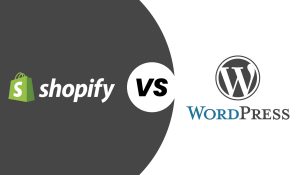 Online shopping has become increasingly convenient than ever before, and the same is the case with building an online marketplace – also called an ecommerce store. Businesses that are considering expanding to the online marketplace need to be aware of the various tools and options available at their disposal.
Online shopping has become increasingly convenient than ever before, and the same is the case with building an online marketplace – also called an ecommerce store. Businesses that are considering expanding to the online marketplace need to be aware of the various tools and options available at their disposal.
While there are several ecommerce tools readily available, Shopify and WordPress are two of the popular as well as widely used platforms. There are various factors that go into deciding the best tool that gives your business the much-needed edge to outdo competitors.
Organizations must consider hiring the best ecommerce website development company to understand their user scenarios before deciding on which tool to employ. Those that already have a website on WordPress, can choose this platform to continue their ecommerce operations by simply installing WooCommerce on the existing website. This would require much less effort.
While businesses will be well served by choosing custom ecommerce website development, those that do not already have a WordPress website must seriously consider Shopify for their ecommerce business, as this would provide a dedicated solution. Shopify also provides numerous features that help you along you along the ecommerce journey.
Which side should you choose in this Shopify vs WordPress battle?
When To Use Shopify Over WordPress?
Shopify was built to provide tailor-made ecommerce solutions, which is immensely popular amongst ecommerce web design companies across segments. Even those without any website building or coding skills can create immersive, responsive and user-friendly websites by themselves. Not just coding, even those who are new to the ecommerce industry find it very easy to build to websites using Shopify. Shopify helps businesses hit the ground running in minutes and begin serving customers almost instantaneously.
Shopify helps streamline multiple aspects of an ecommerce store such as inventory, taxes, shipping, and even delivery methods (with multiple drop shipping options). It provides quick and ready-made solutions to all business and operational aspects, while also being reasonably affordable. Shopify subscription plans start at $29 a month (there is also a trial option for those who want to give it a whirl before committing to it) and can go higher depending on the features and the purposes businesses wish to provide their customers.
With its highly customizable layouts and designs, you will be amazed at the level of sophistication this tool provides – and hence is the most popular custom ecommerce website development tool. With its added SEO friendly features, Shopify not only gets your business up and running, but also suggests best practices to drive traffic to your ecommerce store.
When to Use WordPress Over Shopify?
In its most basic form, WordPress was meant mainly as a blogging platform and does not provide any significant ecommerce features to write home about. WordPress provides these features through a rich plugin ecosystem, out of which the most popular one is WooCommerce. In addition to this, businesses will also need other plugins to handle some features such as SEO and social media.
Although there are many free themes available, there are also paid ones that businesses can use to complement their brands and provide an eye-catching experience, all of which makes the ecommerce store look unique and original.
Some of the best ecommerce developers vouch for the versatility of WordPress as it requires some technical nous, and hence is a better option for those who are technically savvy or can afford a development team to build and maintain their store.
Shopify vs WordPress – Content Management
When it comes to management of static pages and posts, WordPress is the better option. WordPress uses content versioning, i.e., every version of a page or post can be stored, and users can go back to them at any point in time – a feature which Shopify lacks. WordPress also allows businesses to track categories and tags more flexibly than Shopify does.
Users can create custom content styles using WordPress, where Shopify is slightly more rigid in this aspect. This is important because if you wish to change the way that customers see your website, WordPress is the better option. This is the reason why some of the best ecommerce website development companies prefer WordPress over Shopify.
Shopify and WordPress offer rich features, numerous templates, and many other wonderful solutions. to offer. Shopify has multiple subscription options and WordPress although free does need one to subscribe for hosting and use other advanced features.
If you are looking for custom ecommerce website development to take your business onto the online marketplace, contact Smart Sight Innovations, a renowned ecommerce web design company.











